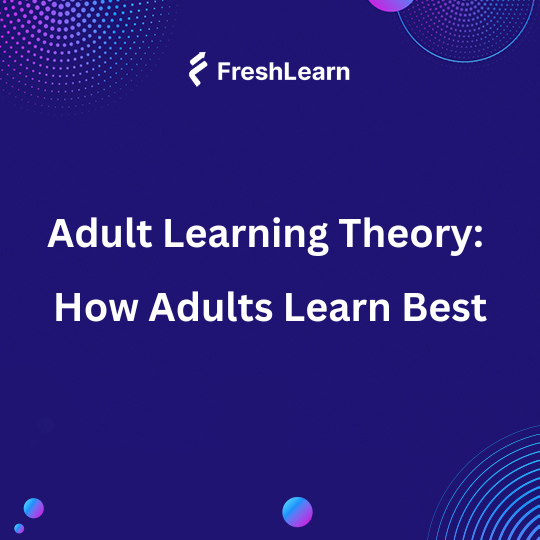
Adult Learning Theory: How Adults Learn Best
Learning is no longer confined to the classrooms of the youth. Today, adults of all ages are participating in all kinds of learning activities to enhance their personal and professional lives.
In 2022, 47% of adults aged 25 to 64 participated in education and training in the last 12 months.
But how do adults learn best? And, what sets them apart from younger learners?
In this blog, we’ll delve into the key principles that make adult learning tick, and discover how this knowledge can revolutionize the way we think about education beyond the traditional classroom.
What Is Adult Learning Theory?
Adult learning, or andragogy, is basically a fancy word for how grown-ups learn best.
Unlike kids, adults know what they want to learn and why. They’re more active learners, wanting to know about things and how to use what they learn in real life.
Think of it this way: We adults want to learn by doing, not just by listening. We want to tackle real-world challenges and find practical solutions.
That's why adult learning often involves activities like group discussions and real-world projects. It's all about making learning meaningful and applicable to our lives.
Adult Learning Vs Child Learning: Understanding Key Differences
While both adults and children learn throughout their lives, there are significant differences in their learning processes and approaches.
Based on different parameters, here are some key differences between the two:
a. Motivation:
Children: Are often intrinsically motivated by curiosity, exploration, and the desire to understand the world around them.
Adults: Are motivated by extrinsic factors like career advancement, personal development, or addressing specific needs.
b. Learning Style:
Children: Tend to learn through play, exploration, and sensory experiences. They benefit from hands-on activities and visual aids.
Adults: Often prefer more structured and goal-oriented learning. They value real-world applications and problem-solving approaches.
c. Role of Experience:
Children: They have limited life experience, making them more receptive to new information and less critical of it.
Adults: Have rich life experiences that can either facilitate or hinder learning. They may have preconceived notions or biases that can influence their understanding.
d. Learning Environment:
Children: Thrive in structured environments with clear rules and routines. They benefit from positive reinforcement and encouragement.
Adults: Prefer more flexible and learner-centered environments. They value autonomy and the ability to pace their learning.
e. Learning Goals:
Children: Focus on developing foundational skills and knowledge.
Adults: Often have specific learning goals related to their personal or professional lives.
f. Teaching Approaches:
Children: Require patient, supportive, and engaging teaching methods.
Adults: Benefit from collaborative, problem-based, and experiential learning approaches.
It's important to note that these are general trends and individual differences can vary greatly.
Effective teaching and learning strategies should take into account the unique needs and characteristics of each learner, regardless of age.
Know About The Principles Of Adult Learning
1. Self-directed learning
Adults are self-directed learners. They take the initiative to determine their learning needs, create goals, and select the learning tactics that are most appropriate for their styles.
This autonomy enables kids to take control of their learning experience.
2. Experience as a learning resource
Adults provide a richness of life experience to the learning process. Their past experiences influence their thoughts and comprehension.
By drawing on these experiences, educators may create relevant and meaningful learning opportunities.
3. Readiness to learn
Adults are most ready to learn when they perceive a need for knowledge or skill. This readiness is often triggered by a specific life event or a desire for personal or professional growth.
4. Problem-centered approach
Adults prefer a problem-centered approach to learning. They are more engaged when they can apply new knowledge and skills to real-world situations. This practical orientation helps them see the relevance of the learning.
5. Internal motivation
Adults are intrinsically motivated to learn. They are driven by personal goals and aspirations, rather than external rewards or punishments.
Educators can foster this internal motivation by creating a supportive and stimulating learning environment.
6. Need to know the reason for learning
Adults need to understand the purpose of learning. They want to know how the new knowledge or skill will benefit them.
By providing clear explanations and demonstrating the practical applications, educators can enhance adult learners' engagement and motivation.
7. Crafting Effective Learning Experiences
To create engaging and relevant learning materials for adults, it is important to consider their requirements and preferences.
Real-world examples, case studies, and problem-solving activities can be used to create learning experiences that are appealing to adult learners.
Furthermore, using a variety of learning modes, such as visual aids, interactive activities, and group discussions, can accommodate different learning styles and improve knowledge retention.
8. Cultivating Supportive Learning Environments
Fostering a good and inclusive learning environment is critical for adult learners' success.
Providing a safe environment for open communication, cooperation, and polite discourse promotes active engagement and critical thinking.
You can motivate students and foster a sense of community by setting clear standards, giving timely help, and acknowledging achievements.
9. Understanding Adult Learner Needs
Conducting a thorough needs assessment is essential for effectively tailoring learning experiences.
This includes assessing adult learners' individual knowledge and ability gaps, as well as their learning objectives and preferences.
Using tactics like surveys, interviews, and focus groups, you can acquire vital insights into their specific needs and adjust learning content accordingly.
10. Providing Meaningful Feedback
Adult learning relies heavily on constructive criticism. By offering timely and relevant feedback, you can assist learners in identifying areas for improvement and celebrating their achievements.
Avoid using judgmental language and instead provide actionable solutions. Encourage self-reflection and goal-setting to help students take responsibility for their learning path.
Challenges In Adult Learning
1. Time constraints
Time constraints can be a significant barrier for adult learners. Balancing employment, family, and personal duties with academic commitments can be difficult. Finding enough time to learn can be difficult, especially when dealing with unforeseen life occurrences.
2. Financial constraints
Financial constraints are another barrier for adult learners. Tuition costs, course materials, and potential income loss from reduced work hours can all add up to a major financial burden.
This can restrict access to educational opportunities and make it harder for adults to achieve their learning objectives.
3. Self-doubt and lack of confidence
Self-doubt and a lack of confidence can impede adult learning. Past unpleasant educational experiences, fear of failure, and self-limiting attitudes can all diminish motivation and impede growth.
To succeed, adult learners must overcome internal hurdles and cultivate a development attitude.
4. Learning style mismatch
Adult learners may experience challenges if their learning styles are incompatible.
Traditional classroom environments may not support diverse learning styles, making it difficult for some students to engage with the material.
A lack of adaptability in learning processes can stifle growth and diminish motivation.
5. Technological barriers
Technological impediments may hinder adult learning, particularly for people who are not tech-savvy.
Access to reliable technology, digital literacy skills, and the ability to navigate online learning platforms are critical for success in today's educational environment.
Limited access to technology or a lack of technical help might provide considerable challenges.
6. Lack of support systems
A lack of support structures can be a significant barrier for adult learners. A supporting network of family, friends, and mentors may offer encouragement, motivation, and practical help.
Without sufficient support, adult learners may feel lonely and struggle to retain their commitment to learning.
Wrapping Up
To sum it up, adult learning is a really interesting journey! It's different from how kids learn.
Adults like to take charge of their learning, draw from their past experiences, and learn best in a friendly environment.
So, to make learning effective, we need to understand these unique needs.
We can create awesome learning experiences by giving adults the freedom to learn at their own pace, using their past knowledge, and providing a supportive space.
As the world changes, it's important to value adult learning and offer opportunities that match their specific needs and dreams.
Ready to take your teaching skills to the next level? Sign up for Freshlearn today and unlock a world of innovative tools and strategies designed specifically for adult learners.


